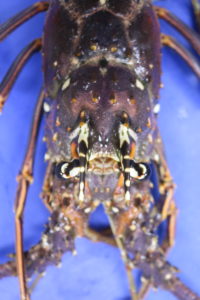Recent research provides evidence that parasites and pathogens may impact a commercially important species which generates $500 million in income for fishers and close to $1 billion in export revenue each year.
As global climate change and warmer water temperature can facilitate the spread of various pathogens in the ocean, increasing attention must be given to the health status of marine organisms, especially those of ecological and commercial interest. Nicole Atherley, a final year PhD student at Ross University School of Veterinary Medicine (St Kitts & Nevis) and fellow of the Caribaea Initiative (a Caribbean-based conservation NGO), have recently come with new and original results about the presence of pathogens in the Caribbean spiny lobster, Panulirus argus in the Eastern Caribbean. The species is considered a delicacy the world over, and, as such, supports an important and broad economy in artisanal fishing, from North Carolina (USA) to Brazil and throughout the Caribbean basin. However, although populations have declined throughout its range, little is known about its diseases and pathogens.

Panulirus argus © Nicole Atherley
In two recently published scientific articles, Nicole Atherley and her coworkers at Ross University reported the infection of Caribbean spiny lobsters with various parasites and pathogens, including bacteria, microsporidians (parasitic fungi), and worms. In particular, about 90% of fecund female lobsters examined around St Kitts were infected with at least one of two species of parasitic Nemertean worms (including a newly described one) that feed on the eggs of their crustacean hosts. Infection with microsporidians and bacteria, on the other hand, were associated with muscle and tail fan necrosis that can seriously affect the commercial value of lobsters. According to Professor Frank Cézilly, founding president of Caribaea Initiative, these findings are of high importance: « It is known that climate change enhances disease processes in crustaceans. Both increasing temperature and ocean acidification act as stressors that negatively affect the ability of ecologically and commercially important species to resist infectious diseases and parasites. The results obtained by Nicole Atherley during her PhD call for further research and a closer monitoring of lobster populations in the Caribbean region in relation to climate change ». Indeed, in line with Caribaea Initiative’s mission, capacity building in marine disease ecology appears to be of prime importance in the insular Caribbean as the region heavily depends on ocean resources for livelihood or tourism. As a native from Barbados, Nicole Atherley is ready for the challenge.
References
Atherley, N.A.M., Dennis, M.M. and Freeman, M.A. (2020). Two species of Carcinonemertes Coe, 1902 (Nemertea: Carcinonemertidae) infesting the Caribbean spiny lobster, Panulirus argus (Latreille, 1804) (Decapoda: Achelata: Palinuridae), in Saint Kitts, West Indies. Journal of Crustacean Biology, ruaa060, https://doi.org/10.1093/jcbiol/ruaa060
Atherley, N.A.M., Freeman, M.A., Dennis, M.M. 2020. Post-mortem examination of the Caribbean spiny lobster (Panulirus argus, Latreille 1804) and common pathology in a fishery of the Lesser Antilles. Journal of Invertebrate Biology, 175: 107453. [doi: 10.1016/j.jip.2020.107453]

